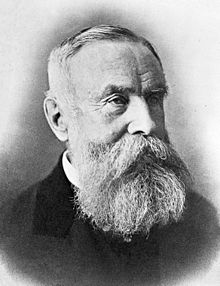Henry Jacob Bigelow
Appearance

Henry Jacob Bigelow (11 March 1818 – 30 October 1890) was an American surgeon and Professor of Surgery at Harvard University. He is remembered for the Bigelow maneuver for hip dislocation, a technique for treatment of kidney stones, and other innovations. He was instrumental in bringing the anesthetic possibilities of ether to the attention of medical men, and rescuing the case of Phineas Gage from relative obscurity.
Surgical Anaesthesia (1894)
[edit]- Surgical Anaesthesia: Addresses and Other Papers, Boston: Little, Brown and Company, 1894. Full text online at the Internet Archive.
- The horrors of Vivisection have supplanted the solemnity, the thrilling fascination, of the old unetherized operation upon the human sufferer. Their recorded phenomena, stored away by the physiological inquisitor on dusty shelves, are mostly of as little present use to man as the knowledge of a new comet or of a tungstate of zirconium: perhaps to be confuted the next year, perhaps to remain as fixed truth of immediate value, — contemptibly small compared with the price paid for it in agony and torture.
- p. 309
- Watch the students at a vivisection. It is the blood and suffering, not the science, that rivet their breathless attention. If hospital service makes young students less tender of suffering, vivisection deadens their humanity, and begets indifference to it.
- p. 310
- It should not for a moment be supposed that cultivation of the intellect leads a man to shrink from inflicting pain. Many educated men are no more humane, are in fact far less so, than many comparatively uneducated people.
- p. 365
- There can be no question that the practice of vivisection hardens the sensibility of the operator and begets indifference to the infliction of pain, as well as great carelessness in judging of its severity.
- p. 368
- Every discoverer of a new truth, or inventor of the method which evolves it, makes a dozen, perhaps fifty, useless combinations, experiments, or trials for one successful one. In the realm of electricity or of mechanics there is no objection to this. But when such rejected failures involve a torture of animals, sometimes fearful in its character, there is a distinct objection to it.
- pp. 369-370
- There will come a time when the world will look back to modern vivisection in the name of science as they now do to burning at the stake in the name of religion.
- p. 370
- Anti-cruelty societies should be encouraged. The progress of science has suffered little by their existence, and humanity has gained much.
- p. 372

